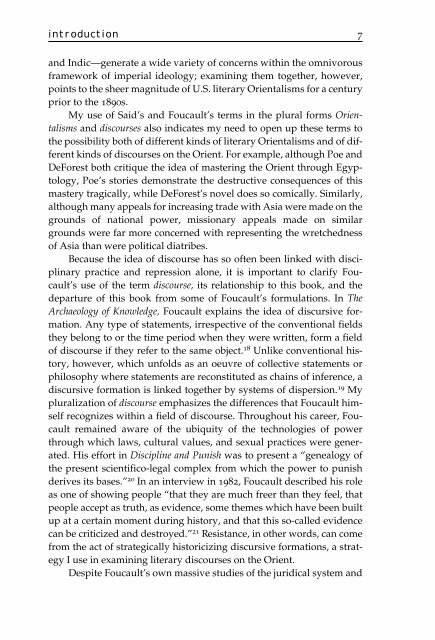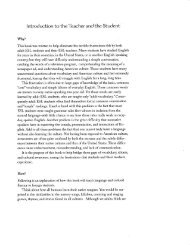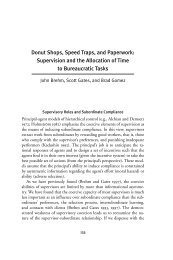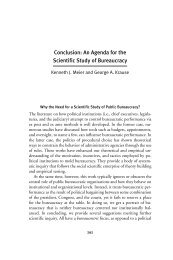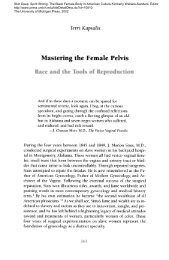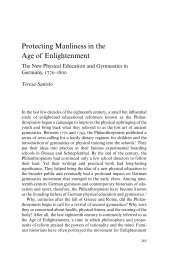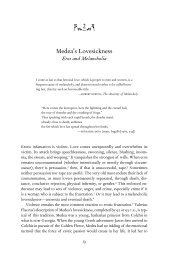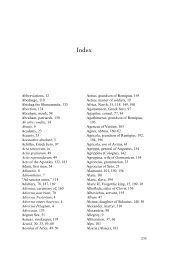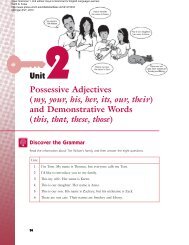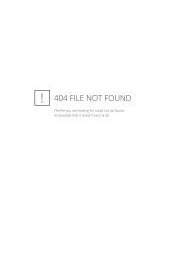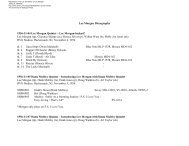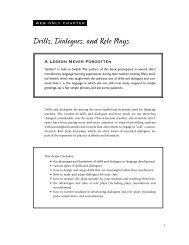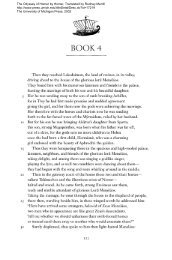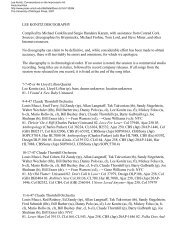Introduction - The University of Michigan Press
Introduction - The University of Michigan Press
Introduction - The University of Michigan Press
Create successful ePaper yourself
Turn your PDF publications into a flip-book with our unique Google optimized e-Paper software.
introduction 7<br />
and Indic—generate a wide variety <strong>of</strong> concerns within the omnivorous<br />
framework <strong>of</strong> imperial ideology; examining them together, however,<br />
points to the sheer magnitude <strong>of</strong> U.S. literary Orientalisms for a century<br />
prior to the 1890s.<br />
My use <strong>of</strong> Said’s and Foucault’s terms in the plural forms Orientalisms<br />
and discourses also indicates my need to open up these terms to<br />
the possibility both <strong>of</strong> different kinds <strong>of</strong> literary Orientalisms and <strong>of</strong> different<br />
kinds <strong>of</strong> discourses on the Orient. For example, although Poe and<br />
DeForest both critique the idea <strong>of</strong> mastering the Orient through Egyptology,<br />
Poe’s stories demonstrate the destructive consequences <strong>of</strong> this<br />
mastery tragically, while DeForest’s novel does so comically. Similarly,<br />
although many appeals for increasing trade with Asia were made on the<br />
grounds <strong>of</strong> national power, missionary appeals made on similar<br />
grounds were far more concerned with representing the wretchedness<br />
<strong>of</strong> Asia than were political diatribes.<br />
Because the idea <strong>of</strong> discourse has so <strong>of</strong>ten been linked with disciplinary<br />
practice and repression alone, it is important to clarify Foucault’s<br />
use <strong>of</strong> the term discourse, its relationship to this book, and the<br />
departure <strong>of</strong> this book from some <strong>of</strong> Foucault’s formulations. In <strong>The</strong><br />
Archaeology <strong>of</strong> Knowledge, Foucault explains the idea <strong>of</strong> discursive formation.<br />
Any type <strong>of</strong> statements, irrespective <strong>of</strong> the conventional fields<br />
they belong to or the time period when they were written, form a field<br />
<strong>of</strong> discourse if they refer to the same object. 18 Unlike conventional history,<br />
however, which unfolds as an oeuvre <strong>of</strong> collective statements or<br />
philosophy where statements are reconstituted as chains <strong>of</strong> inference, a<br />
discursive formation is linked together by systems <strong>of</strong> dispersion. 19 My<br />
pluralization <strong>of</strong> discourse emphasizes the differences that Foucault himself<br />
recognizes within a field <strong>of</strong> discourse. Throughout his career, Foucault<br />
remained aware <strong>of</strong> the ubiquity <strong>of</strong> the technologies <strong>of</strong> power<br />
through which laws, cultural values, and sexual practices were generated.<br />
His effort in Discipline and Punish was to present a “genealogy <strong>of</strong><br />
the present scientifico-legal complex from which the power to punish<br />
derives its bases.” 20 In an interview in 1982, Foucault described his role<br />
as one <strong>of</strong> showing people “that they are much freer than they feel, that<br />
people accept as truth, as evidence, some themes which have been built<br />
up at a certain moment during history, and that this so-called evidence<br />
can be criticized and destroyed.” 21 Resistance, in other words, can come<br />
from the act <strong>of</strong> strategically historicizing discursive formations, a strategy<br />
I use in examining literary discourses on the Orient.<br />
Despite Foucault’s own massive studies <strong>of</strong> the juridical system and


